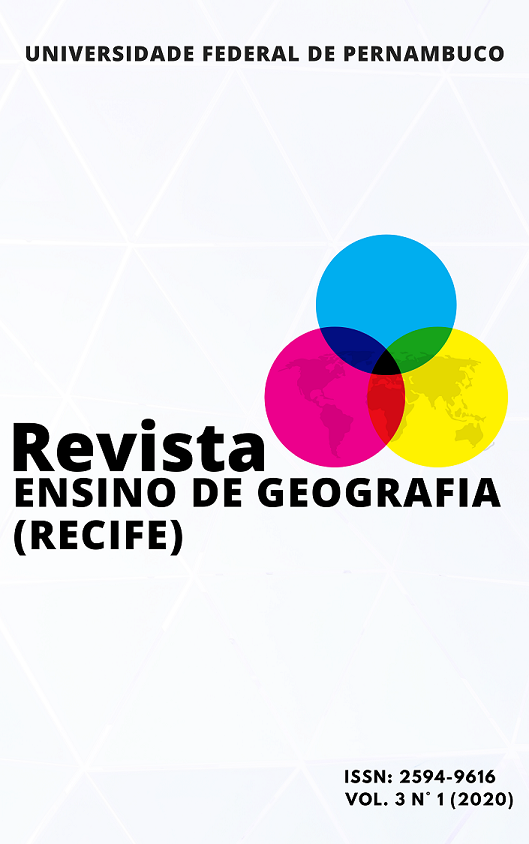Conscious consumption through environmental education in school
DOI:
https://doi.org/10.51359/2594-9616.2020.244511Keywords:
School Life, Transversality, CriticalityAbstract
This paper focused on researching a theoretical framework capable of supporting the production of proposals and actions for the realization of Environmental Education (AE) at school through transversality. It continues with support from CAPES (Coordenação de Aperfeiçoamento de Pessoal de Nível Superior/Higher Education Personnel Improvement Coordination) instigating debates about the relationship between EE and the construction of conscious consumption in the school environment. The research points to a qualitative approach focusing on Critical Environmental Education. For this, we need to recognize the importance of advancing in the appropriation of instruments that contribute to the production of criticality in the reflection of actions to social values materialized in school. Thus, we present the project “Conscious Consumption, Smart School”, to be implemented in Basic Education, elementary school II. Through it, it is possible to relate the EE and the contents of various knowledge, using subjects that involve the daily school and actions inthis space, culminating beyond the critical view, but the view able to propose solutions that balance consumption and the environment
References
BOFF, L.. Cuidar da Terra, proteger a Vida: como evitar o Fim do Mundo. Rio de Janeiro: Record, 2010.
BRASIL. Secretaria de Educação Fundamental. Parâmetros Curriculares Nacionais: apresentação dos Temas Contemporâneos Transversais, ética/Secretaria de Educação Fundamental. Brasília: MEC/SEF, 1997.
BRASIL.. Ministério da Educação. Temas Contemporâneos Transversais na BNCC: contexto histórico e pressupostos pedagógicos. MEC, 2019. Brasília, DF, 2019. Disponível em http://basenacionalcomum.mec.gov.br/images/implementacao/contextualizacao_temas_contemporaneos.pdf Acesso em 01 Nov. 2019.
CARVALHO, I. C. de M. Educação ambiental crítica: nomes e endereçamentos da educação. In: Identidades da educação ambiental brasileira / Ministério do Meio Ambiente. Diretoria de Educação Ambiental; Philippe Pomier Layrargues (coord.). – Brasília: Ministério do Meio Ambiente, 2004, p. 13-24.
CNE/CEB (Conselho Nacional de Educação/Câmara de Educação Básica). Resolução Nº 7, de 07 de abril de 2010. Fixa Diretrizes Curriculares Nacionais Gerais para a Educação Básica. Diário Oficial da União, Brasília, 09 de julho de 2010, Seção 1, p. 24. Disponível em: http://portal.mec.gov.br/index.php?option=com_docman&view=download&alias=5367-pceb007-10&category_slug=maio-2010-pdf&Itemid=30192. Acesso em: 01 Nov. 2019.
DIAS, G. F. Educação ambiental: princípios e práticas. São Paulo, Gaia, 1992.
INSTITUTO AKATU. Conheça as 6 perguntas do consumo consciente que ajudam a diminuir impactos negativos no meio ambiente. Akatu. 30 de maio de 2017. Disponível em: https://www.akatu.org.br/releases/conheca-as-6-perguntas-do-consumo-consciente-que-ajudam-diminuir-impactos-negativos-no-meio-ambiente/ Acesso em: 10 de Out. 2019.
GUIMARÃES, M. Educação ambiental crítica. In: Identidades da educação ambiental brasileira / Ministério do Meio Ambiente. Diretoria de Educação Ambiental; Philippe Pomier Layrargues (coord.). – Brasília: Ministério do Meio Ambiente, 2004, p. 25-34.
GUIMARÃES, M. A dimensão ambiental na educação. Campinas, SP: Papirus, 1995, 107 p.
LIGA sustentável. Produção FCDL/Santa Catarina. Santa Catarina, 2018. 4º vídeo 4’34”. Disponível em http://ligasustentavel.com.br/videos/4o-episodio/ Acesso em: 07 de out. 2019.
REDAÇÃO PENSAMENTO VERDE. Ecologia e educação ambiental por um futuro melhor. Pensamento Verde, 23 de Mai., 2013. Disponível em: https://www.pensamentoverde.com.br/atitude/ecologia-e-educacao-ambiental-por-um-futuro-melhor/#. Acesso em: 10 de out. 2019.
RIO 92. Tratado de educação ambiental para sociedades sustentáveis e responsabilidade global. Documento elaborado pelo Fórum Global das Organizações Não Governamentais, na Conferência das Nações Unidas sobre o Meio Ambiente e Desenvolvimento. Rio de Janeiro, 1992.
Disponível em http://portal.mec.gov.br/secad/arquivos/pdf/educacaoambiental/tratado.pdf
Acesso em: 10 de Out. 2019.
SATO, M. Apaixonadamente pesquisadora em educação ambiental. Educação: Teoria e Prática. Vol. 9, nº 16, jan-jul, 2001 e nº 17, jul-dez, 2001, p. 24-35.
VARGAS, C. B. de. Sustentabilidade e Consumo Consciente: A Percepção da Evolução do Modo de Consumir e como isso Pode Afetar a Gestão nos Próximos Anos. In: XV Mostra de Iniciação Científica, Pós-Graduação, Pesquisa e Extensão, 1, 2015, Caxias do Sul, 2015. p. 02-06.
Downloads
Published
How to Cite
Issue
Section
License
Copyright (c) 2021 Leandra de Lourdes Rezende Amaral, Gabriel Gonçalves Arantes, Maria Beatriz Junqueira Bernardes

This work is licensed under a Creative Commons Attribution 4.0 International License.
Authors who publish with this journal agree to the following terms:- Authors retain copyright and grant the REVISTA ENSINO DE GEOGRAFIA (RECIFE) right of first publication with the work simultaneously licensed under a Creative Commons Attribution NonCommercial International 4.0 (CC BY-NC) that allows others to share the work with an acknowledgement of the work's authorship and initial publication in this journal.
- Authors are able to enter into separate, additional contractual arrangements for the non-exclusive distribution of the journal's published version of the work (e.g., post it to an institutional repository or publish it in a book), with an acknowledgement of its initial publication in this journal.
- Authors are permitted and encouraged to post their work online (e.g., in institutional repositories or on their website) prior to and during the submission process, as it can lead to productive exchanges, as well as earlier and greater citation of published work.



